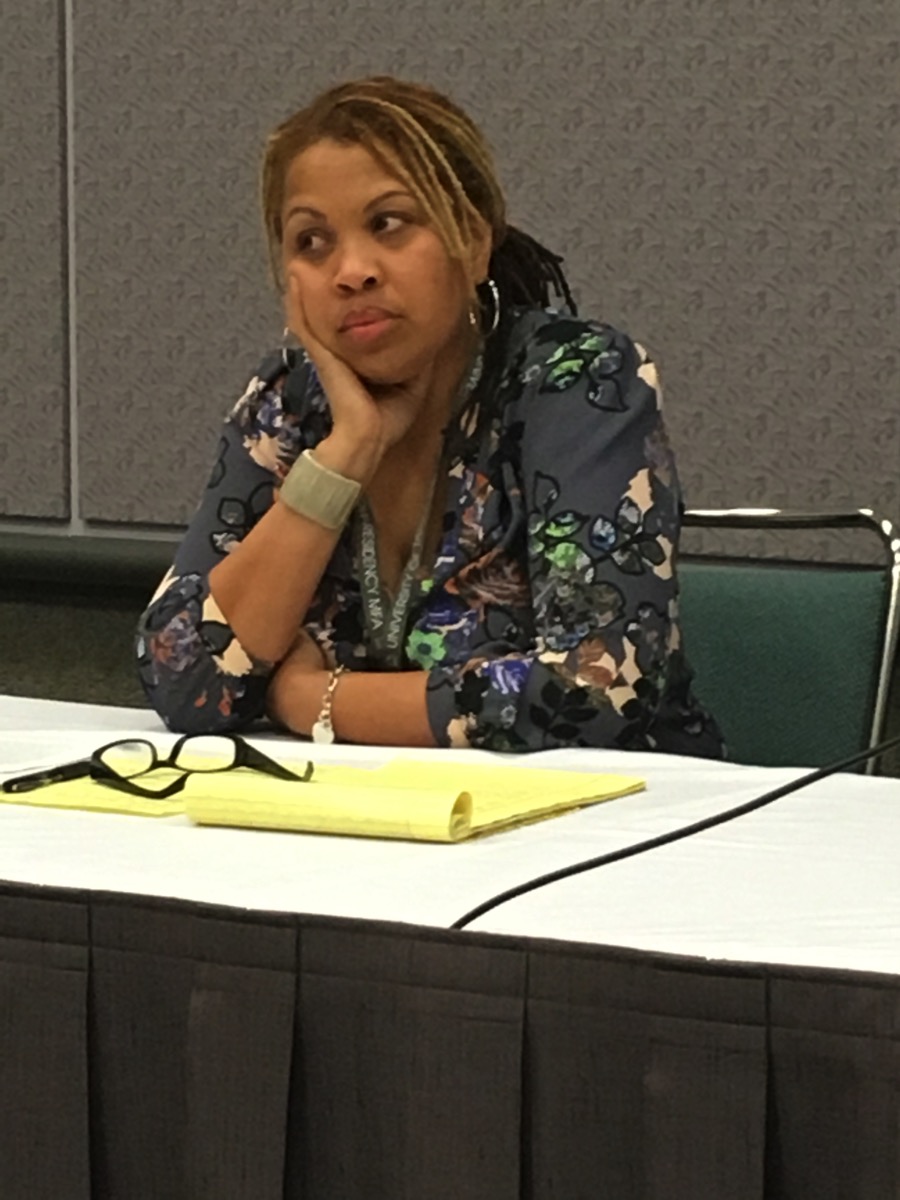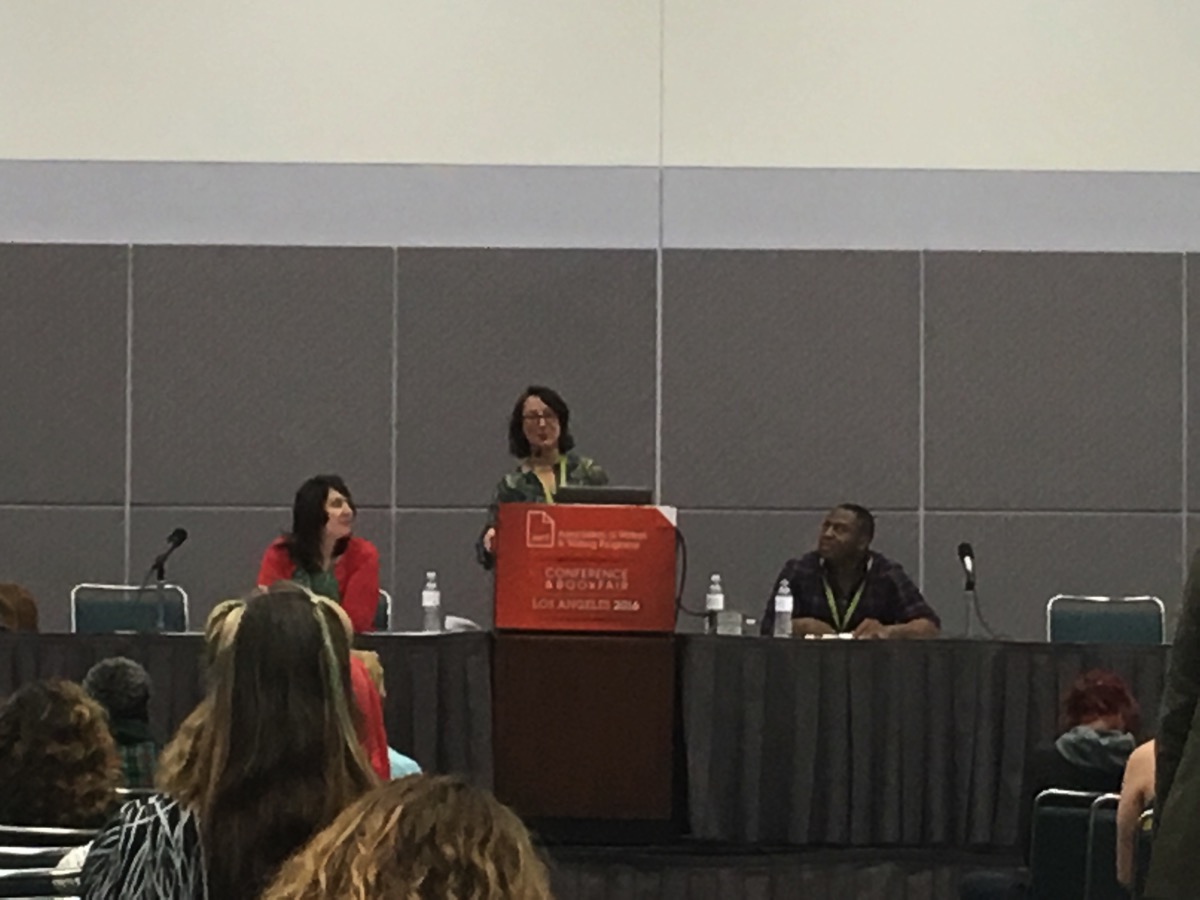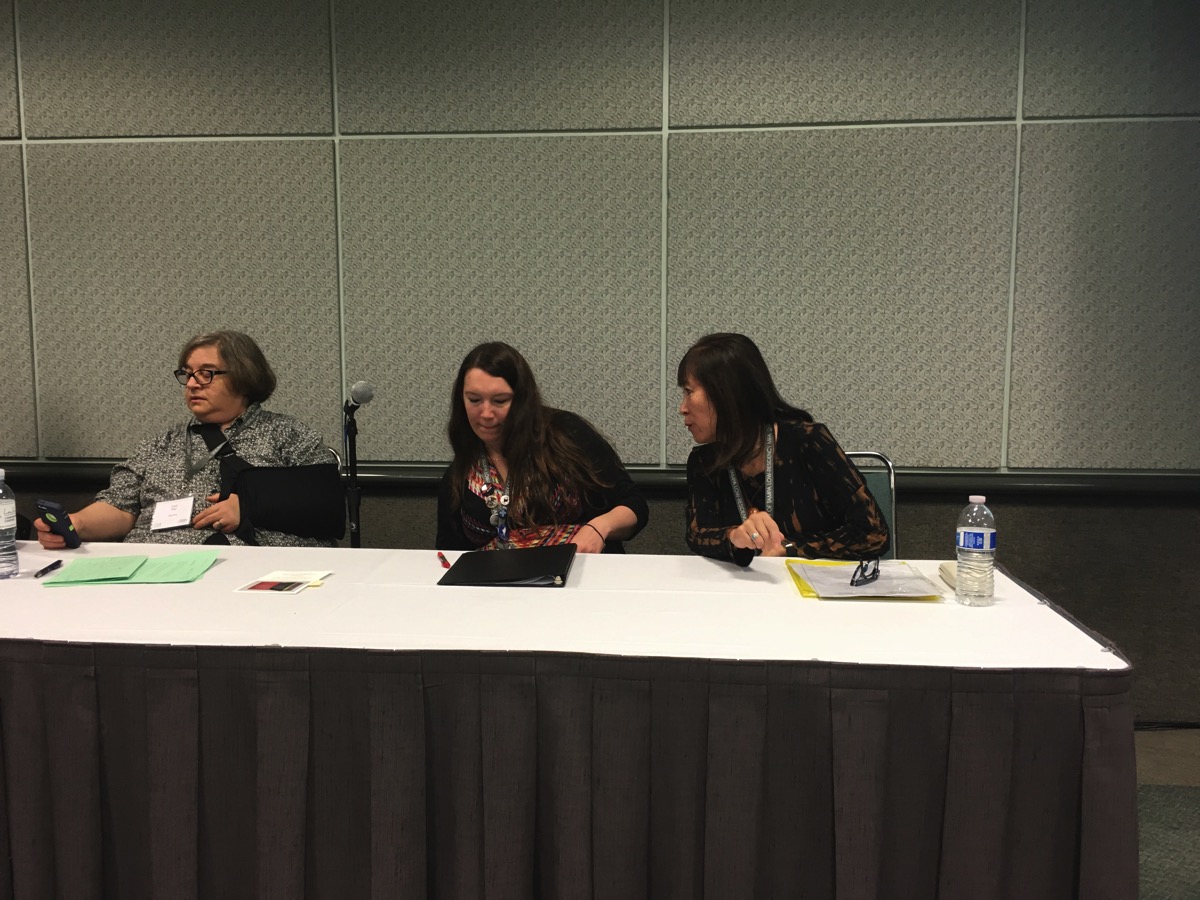Invisible to Whom?: Black Fiction Writers on Craft and the White Gaze
 I had a long list of potential Saturday at 9a panels and realized that part of the reason that it was so long was that I wasn’t really excited about any of the options so I decided that this would be a good day for a late start to the day.
I had a long list of potential Saturday at 9a panels and realized that part of the reason that it was so long was that I wasn’t really excited about any of the options so I decided that this would be a good day for a late start to the day.
I woke up half an hour before my alarm was set and ended up getting to the convention center a bit before 9a anyway, so I took the time to rest a bit before my first real panel of the day.
We had a mix of discussion of general concerns surrounding the idea of African-American literature and readings by some of the panel members. Of these, by far the standout piece was by Cole Lavalais (pictured to the right. It was just a coincidence she was photographed on her own—I took pictures at the start of the panel and she didn’t fit into the frame for a group photo), who read her story, “A Lost Lesson in Evolution on the 3:16p from Chicago to Blue Island; Or Adaptation.” She is definitely an author to watch and her debut novel will be out later this year.
There was an observation made that often diversity panels such as these generally attract a completely or almost completely non-white audience but in this instance, they managed to avoid that problem. While the audience looked majority minority at least from my seat near the front, their were still a fair number of white faces in the audience.
I do think that there was a cultural thing happening when during audience question time, one person stood up and entered into a somewhat lengthy monolog that seemed to be mostly about his own writing (this is apparently a not uncommon occurrence at AWP panels) and another audience member interjected by saying, “is there a question here?” Thumbs up on that one.
Also, this ended up being a chance for some cultural education for me (and likely other white audience members). Andy Johnson talked about Sarah Bartmaan and said, that we would all know who she was (I, at least did not). I picked up a bit from his further remarks, and a bit more from wikipedia. The fact that this was someone well known to the African-American members of the audience and (I’m guessing) not so much to the others is itself its own interesting cultural commentary.
The other thing I learned was the use of “woke” as an adjective (along with assorted adjectival derivatives, such as the noun “wokeness”) meaning a state of awakening with respect to racial issues. I’m guessing that after this panel, I was a little bit more woke (although I’d like to think that I wasn’t completely unwoke beforehand).
It was also fascinating to hear about Dianca London’s experiences with workshop which would have been comical if they weren’t so tragic. With regard to one piece she had written about an albino black woman in the late eighteenth century, the comments included: “is this about white slavery?” “Can black people have albinism?” “Is this sci-fi?” Other workshop comments included a white professor (while dressed in an “ethnic” outfit), saying, “You don’t understand the implications of the trans-Atlantic slave trade.” Another student saying, “We get it. Slavery happened. Get over it.” In one discussion where a white student’s story used the N-word extensively, “Chill out. It’s the character’s conceit.” And then the general feedback of “too black, not black enough, pulling the race card.” London’s attitude was summarized well when she said that she wasn’t there to ease the discomfort of white literary privilege, “God grant me the privilege of a mediocre white straight man.” As one of said mediocre white straight men, I have to say that I recognize my privilege which includes among other things, having the freedom to write from other perspectives without being told that I need to stay in my own little box because that’s where I belong.
There’s a lot more that I have in my notes, but I’ll leave it at any of the writers on this panel are definitely worth reading (and if by some strange chance an editor were to read this blog post, for God’s sake, publish these amazing writers and don’t shove them into a box not recognizing the complexities of the African-American experience).

Applying for an Individual Creative Writing Fellowship
I had some high hopes for this panel that were quickly dashed as I began to feel like the presenters were telling us things that were also on the website. Add in some accessibility problems, viz, inconsistent mic usage, small print on the powerpoint slides, etc. and I was getting discouraged before it became clear that the “secret” to getting an NEA grant is pretty much the same as the secret to getting out of the slush pile: write good shit. The only notable thing was that it was clear that the writing sample was, at bottom, the only significant factor in the selection process.

Wild Equations: A Math Poetry Reading
Finally, the last panel I attended was a reading of “math poetry” which consisted of the contributors to a special math poetry issue of Talking Writing. The poems dealt with the mathematical content at differing levels of sophistication (two of the panelists are either current or former math teachers in edition to being poets).


Odds and ends
Between panels, I skulked the floor of the bookfair like a vulture in search of carrion as I picked up free copies of journals that the day before would have cost money. My final loot (including one journal I paid my hard earned dollars for is pictured below.

And I would be remiss if I were to omit the fact that my sojourn was partially underwritten (as in, they gave me my admission) by the MFA program from which I graduated at the University of Tampa, who had plenty of admissions to distribute thanks to their being the official lanyard of AWP2016.
Leave a Reply